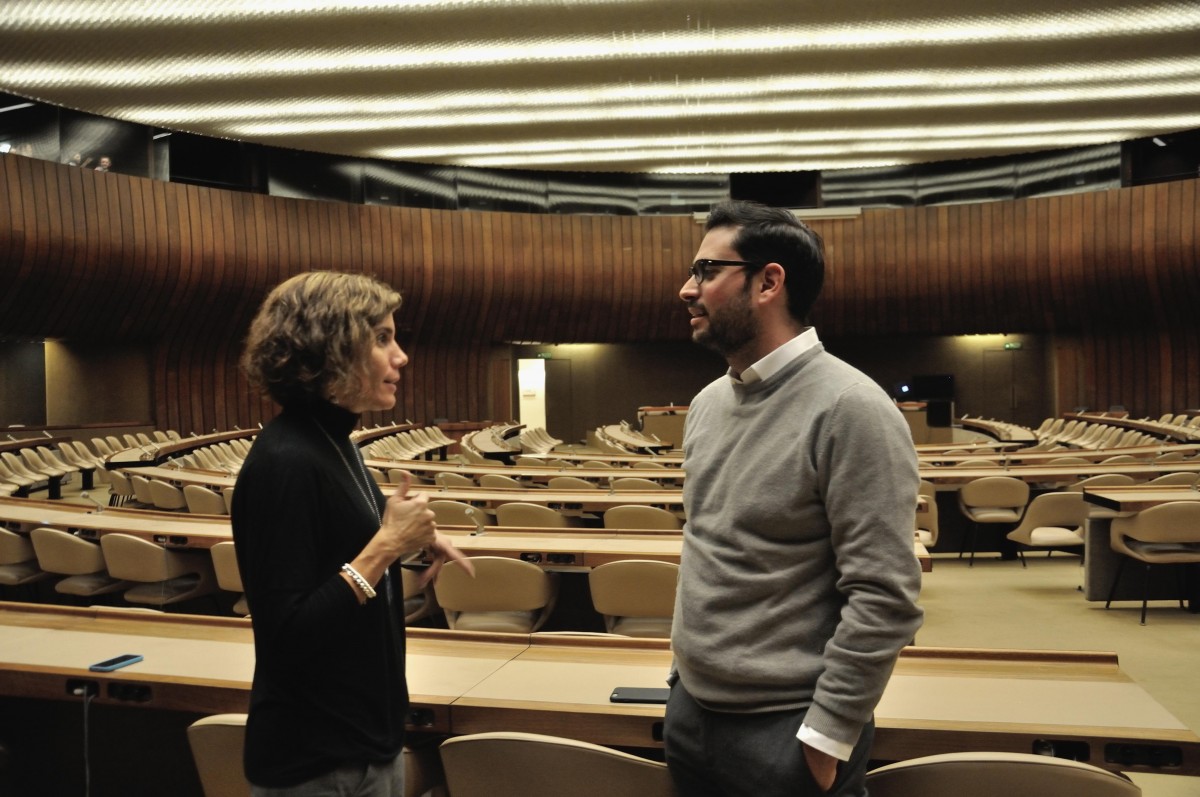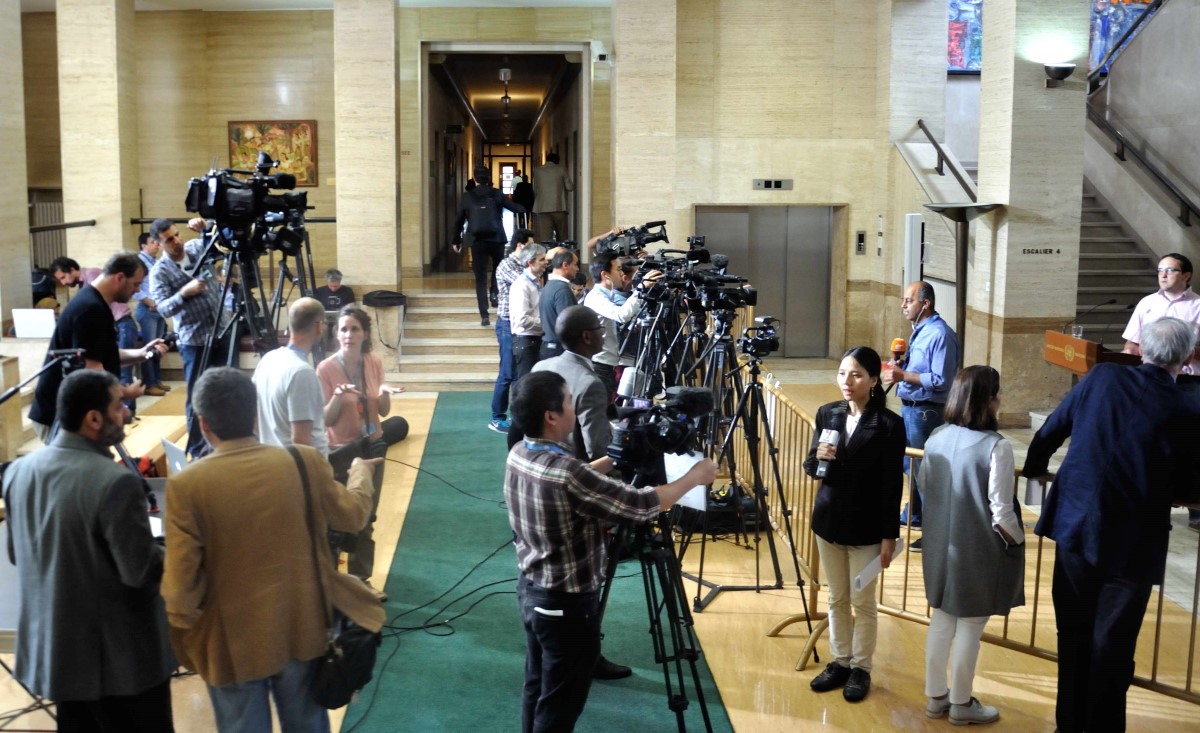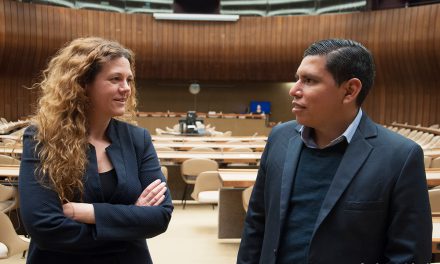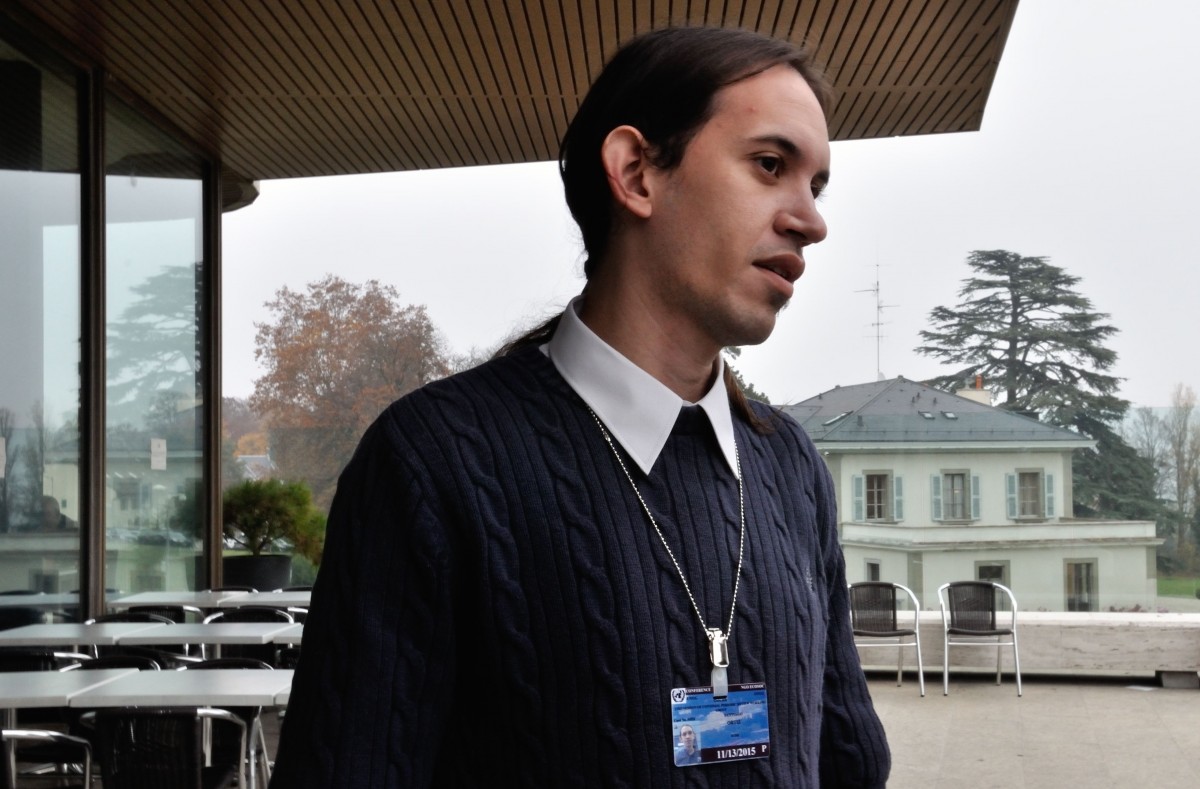By: Carmen Lucía Castaño
Geneva, 14 November – Throughout this week a delegation comprised of relatives of assassinated Paraguayan journalists, the secretary general of the Paraguayan Journalists’ Union (SPP, in Spanish), and Rachael Kay and Omar Rábago visited Geneva to denounce the deterioration in freedom of expression in the South American country before the United Nations. Kay and Rábago are, respectively, the deputy executive director and convenor of the council of IFEX, the global network promoting and defending free expression.
In addition to meeting with the UN Office of the High Commissioner for Human Rights’ delegate for Paraguay, the delegation also presented the issues to more than 30 diplomatic missions in order to request the formulation of recommendations regarding protection of journalists directed toward the Paraguayan government, within the framework of the upcoming Universal Periodic (UPR) scheduled to take place in January 2016.
Panorama spoke with Kay and Rábago about IFEX, their meetings in Geneva and the situation for journalists in Paraguay.
What is the focus of IFEX’s work?
Rachael Kay: IFEX is a network of 104 organisations that work to defend and promote the right to freedom of expression throughout the world. We do this by way of awareness-raising campaigns and dissemination of information on both this fundamental right and on impunity, and by institutional strengthening of the network’s member organisations.
In Latin America and the Caribbean we have worked since 2009 via the IFEX-ALC alliance. Twenty-two of our local organisations participate in this alliance, which has as its objective the sharing of knowledge and local experience that can be replicated, although with nuanced variations, in other countries of the region.
Our campaigns are directed toward an audience that is knowledgeable and relatively familiar with the issues that concern us. Recently we have made steps forward in dialogue with governments to strengthen the political will to improve the situation regarding impunity.
We know that this phenomenon is not going to end from one day to the next, but a change of attitude on the part of governments can prevent an increase in attacks on journalists and freedom of expression violations. This is what we are trying to do in Paraguay.
Why did you decide to start this campaign focusing on the situation in Paraguay?
Omar Rábago: Because Paraguay isn’t on anyone’s radar. There is a lot of discussion of the classic cases of attacks on journalists in Latin America: in Colombia, Mexico and Honduras, or with some nuances, in Ecuador and Venezuela. But the situation in Paraguay is invisible, despite the fact that it has greatly deteriorated: 40% of assassinations of journalists since 1991 were committed within the last three years.
The situation is shared with several countries in the region: impunity, lack of access to justice, failure to carry out thorough investigations, involvement of authorities in the cases, corruption…
There are countries where journalists are violently attacked, like Honduras and Colombia. But there are also other forms of intimidation, such as the use of government advertising to reward or punish, which is a way for the politically powerful to control information. In addition, we have the phenomenon of media concentration, whether by the government or by power economic elites.
On the other side are the citizens, whose access to information is part of their right to freedom of expression. It is common to find cases in which the legislation guarantees these rights, but in reality the laws are not backed up by mechanisms that support them. In practice, this results in freedom of expression being guaranteed on paper, but in reality this right cannot be fully enjoyed.
What is the current situation for journalists in Paraguay?
OR: In Paraguay there have been 17 assassinations of journalist in the last 24 years. During an IFEX mission this year to prepare for advocacy work associated with the formulation of recommendations for the UPR, we found that the files relating to these case are not even well developed. This speaks to the collapse of the judicial system in general, not just in cases involving journalists: we’re talking about a level of impunity that reaches 90% in most of the region.
Killing a journalist is a very strong message to the family, society in general and the journalist’s colleagues. This was demonstrated in Ciudad Juárez, Mexico, where they killed one journalist and another nine left for the United States. It is also a way of cutting off the flow of information. If a political or economic entity or an organised crime group wants to prevent something from being made public, it is easier to physically attack a journalist than it is to buy out the media. In addition, if impunity reigns, then killing a journalist is a cheap proposition.
In Paraguay, because of what has happened in the last three years, we see this as a good time to act and prevent a snowball effect, because if this is not stopped it will continue happening and the cases will just keep accumulating. There are 17 cases, but despite all the time that has passed it is very difficult to find evidence to prosecute those responsible. After 24 years, what are they going to do? Are they going to take fingerprints? Are they going to call witnesses? So the files just keep accumulating, similar to the situation in Mexico, where there have been 83 assassinations of journalists since 2000. This is why we want Paraguay to tackle this problem once and for all.
How do you plan to tackle this?
OR: By providing technical assistance and generating pressure from international bodies. This is the way it works in this region. Governments only react when an international body takes the information from an organisation like IFEX, because they feel pressured. In Colombia, for example, a mechanism to protect journalists was created when USAID provided funding for the process to go forward.
It is a question of political will because states are reluctant to admit that something is wrong and that is the point: to admit that if impunity exists, it is because judges are failing to correctly handle the preliminary investigations, which then results in a failure to sentence those responsible. This is a structural problem, and it is difficult to recognise. This is why the Guatemalan case is so exceptional, where they accepted the International Commission against Impunity, admitting that they could not do it alone. Many states do not take this on because of pride, sovereignty… but with small steps, a little pressure, you can start moving forward.
This is what we are trying to do in Paraguay: come to a point where the government admits there is a problem. This is the first step toward a solution. From there, it is a matter of offering technical assistance, and hopefully financial resources, to implement a protective mechanism to safeguard the physical integrity of journalists and strengthen the judicial system to combat impunity. These are two directions that should be embarked upon simultaneously.
What actions have you carried out previously to advocate for journalists in Paraguay? Have you entered into dialogue with the government?
RK: IFEX colleagues from Brazil, Guatemala and Colombia conducted an investigative mission in May to prepare the report for the UPR. They met with officials from the Interior Ministry and found that the 17 homicide case files are incomplete and the authorities admitted that there are weaknesses in the system for carrying out the investigations into these crimes.
I think we must work with the authorities if we are asking for things that depend upon them. In the final analysis, it is the state’s responsibility. The situation exists partially because they don’t want to address it and partially because they can’t. Our job is to increase the desire to address it and strengthen the ability to do so.
How will you continue this work after the Universal Periodic Review of Paraguay?
RK: We are going to continue working with the Paraguayan Journalists’ Union, our local member, to further the campaign at the national level because it is important to ensure the continued prominence of this issue. This was a lesson we learned when we worked on the UPR for Honduras: we were highly involved before the UPR, but not after, in following up with the campaign. We realized that it is very difficult to measure the impact if we just emphasise a particular moment.
In the case of Paraguay, it is a matter not only of following up on the freedom of expression recommendations that are formulated as a result of the UPR, but also to work on the investigations into journalist assassinations and present cases to the Inter-American Human Rights System.
OR: The most important thing is to continue to support the SPP. There are organisations that have a lot of experience with documentation, with protection, and IFEX makes it possible to share this experience. For example, the Foundation for Press Freedom, IFEX’s member in Colombia, shares its knowledge of mechanisms, documentation protocols, security and protection. So everyone contributes and this also assists the local member in not being so alone, not working in a vacuum.
In summary, we carried out the mission, produced a report, came to Geneva, and once the UPR is over we will continue with a local campaign strategy. We will seek to make noise in the media and we will accompany the SPP so that it can continue its work, because IFEX cannot provide unlimited follow-up but the process must continue.
Spanish version available here.







